
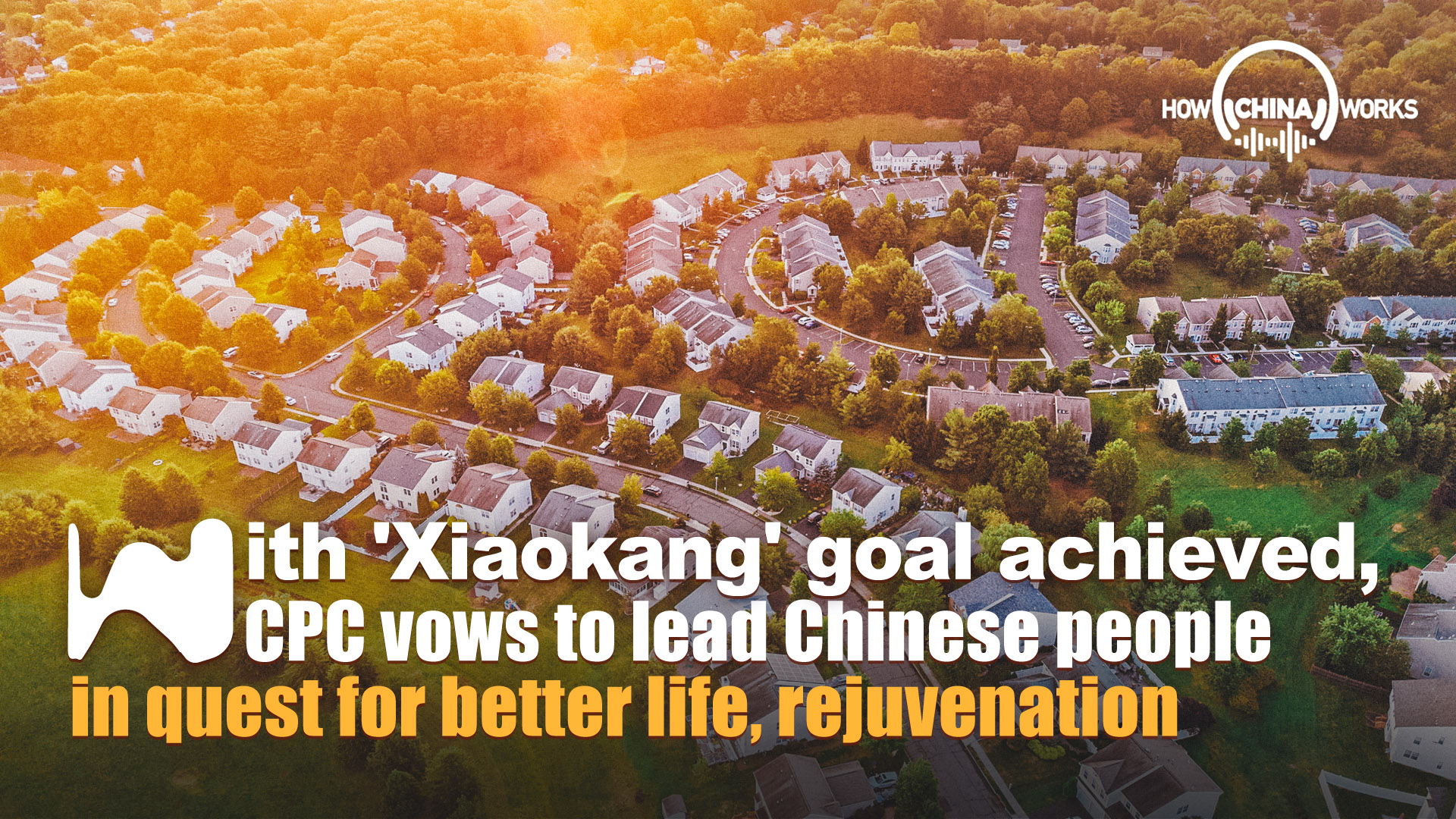
China on Thursday announced a landmark victory in building a moderately prosperous society in all respects, known as a "Xiaokang" society in Chinese, as the Communist Party of China (CPC) celebrates its centenary.
"We have realized the first centenary goal of building a moderately prosperous society in all respects," Chinese President Xi Jinping said at a grand gathering at Tian'anmen Square in Beijing.
Xi, also general secretary of the CPC Central Committee and chairman of the Central Military Commission, vowed that the CPC will lead the Chinese people to strive for better lives and national rejuvenation.
Founded in July 1921 with just over 50 members, the CPC has grown into the world's largest political party with more than 95 million members.
The Party had set two centenary goals: The first was to build a moderately prosperous society in all respects by 2021 when the CPC celebrates its centenary, and the second is to build China into a great modern socialist country in all respects by the middle of the century to celebrate the centenary of the People's Republic of China (PRC).
Read more:
Chart of the Day: China builds moderately prosperous society in all respects
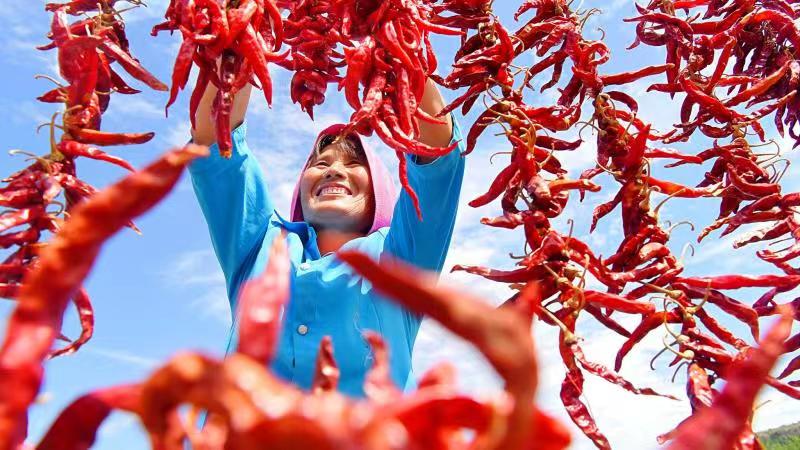
From humiliation to 'Xiaokang'
Xi reviewed the historical background of the CPC's creation and explained the role it played in the nation's efforts to realize rejuvenation.
After the Opium War in the 1840s, China gradually became a semi-colonial, semi-feudal society and endured intense humiliation and the people suffered great pain, Xi noted. "Since that time, national rejuvenation has been the greatest dream of the Chinese people and the Chinese nation."
After a series of attempts to "save the nation" failed, the CPC was created when the country urgently needed new ideas and a new organization to lead the movement, he said.
"Since the very day of its founding, the Party has made seeking happiness for the Chinese people and rejuvenation for the Chinese nation its aspiration and mission," he said.
Xi summarized the Party's efforts and successes in leading a series of revolutions and the country's modernization, particularly in pursuing reform and opening-up since 1978, which he called a "crucial move in making China what it is today."
China, a relatively poor country decades ago, has become the world's second largest economy with its gross domestic product (GDP) exceeding 100 trillion yuan (about $15 trillion) and per capita GDP over $10,000. It declared the victory in eradicating absolute poverty nationwide by the end of 2020.
Highlighting the fulfillment of building a "Xiaokang" society and other achievements, Xi said the Party and the people have shown the world that "China's national rejuvenation has become a historical inevitability."
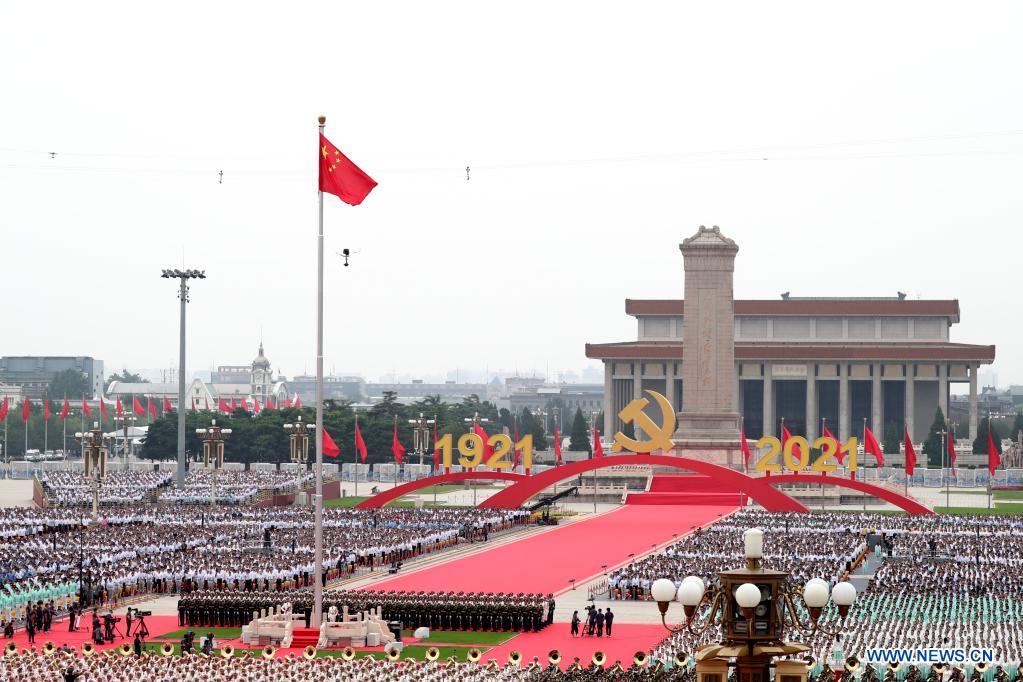
A gathering to celebrate the centenary of the CPC is held at Tian'anmen Square in Beijing, July 1, 2021. /Xinhua
CPC's close ties with the people
Xi underscored the close relations between the CPC and the people, stressing that the Party "has always represented the fundamental interests of all Chinese people."
"Any attempt to divide the Party from the Chinese people or to set the people against the Party is bound to fail," he warned.
As China embarks on a new journey toward socialist modernization, he vowed that the CPC will continue to practice a people-centered philosophy of development, address the people's concerns and promote common prosperity for all.
"On the journey ahead, we must rely closely on the people to create history," he said.
The people-centered philosophy of development was raised by Xi at the fifth plenary session of the 18th CPC Central Committee in October 2015. The philosophy stresses that China's development must be for the people and by the people, and its fruits shared among the people.
The philosophy has been emphasized again in China's latest development blueprint – the Outline of the 14th Five-Year Plan (2021-2025) for National Economic and Social Development and the Long-Range Objectives Through the Year 2035. The document vows to further improve people's livelihoods by pursuing more balanced, higher-quality development.
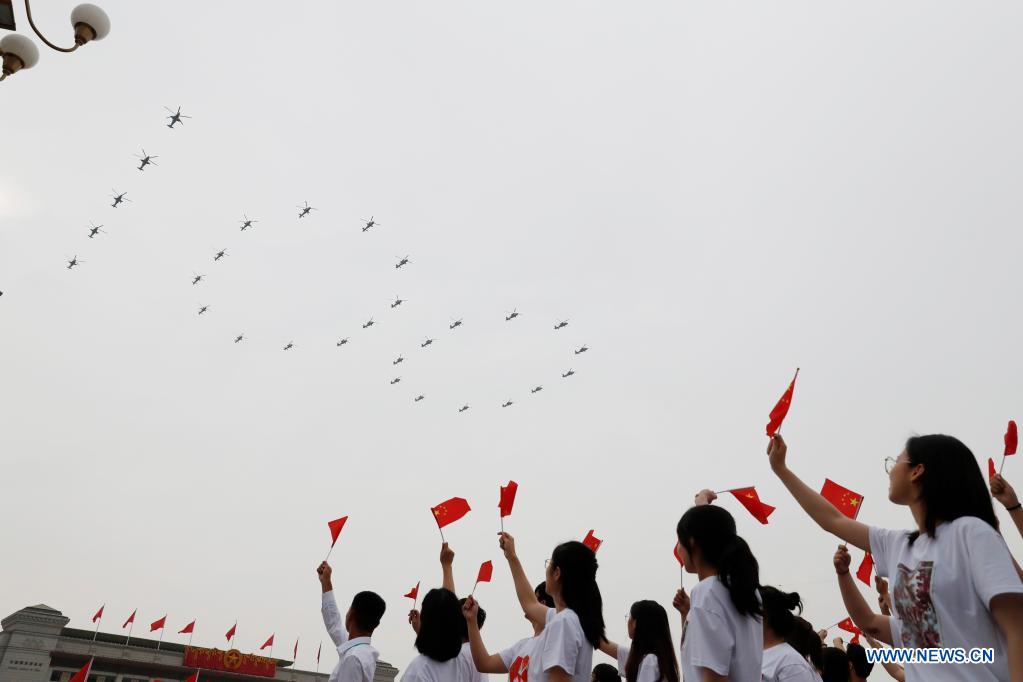
Military aircraft fly over Tian'anmen Square in echelons ahead of a gathering celebrating the centenary of the CPC in Beijing, July 1, 2021. /Xinhua
China's commitment to peaceful development
Xi also expounded on the main principles of China's foreign policy and vision on international relations. He reiterated the call for building a community with a shared future for humanity and stressed the country's commitment to peace.
"The Chinese nation does not carry aggressive or hegemonic traits in its genes," Xi said. "China has always worked to safeguard world peace, contribute to global development and preserve international order."
China will stay committed to the path of peaceful development, he said. It will "promote high-quality development of the Belt and Road Initiative (BRI) through joint efforts and use China's new achievements in development to provide the world with new opportunities," he added.
Proposed by Xi in 2013, the BRI which comprises the Silk Road Economic Belt and the 21st Century Maritime Silk Road, aims to build trade and infrastructure networks connecting Asia with Europe and Africa along and beyond the ancient Silk Road routes.
A total of 140 countries and regions have signed cooperation agreements with China under the BRI over the past eight years. The aggregated trade volume between China and its BRI cooperative partners has exceeded $9.2 trillion, and Chinese companies have made direct investments totaling over $130 billion in countries along the Belt and Road.
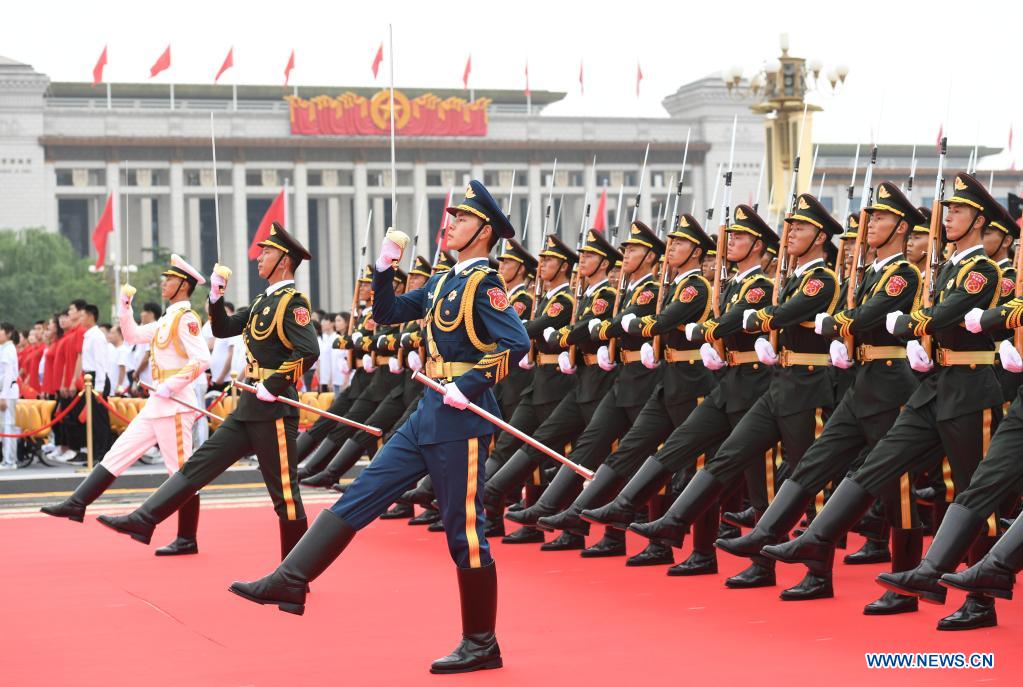
The national flag guards march during a flag-raising ceremony at a gathering celebrating the centenary of the CPC at Tian'anmen Square in Beijing, July 1, 2021. /Xinhua
Meanwhile, Xi said China will continue to champion cooperation over confrontation and oppose hegemony and power politics.
The Chinese people have a strong sense of pride and confidence and will not be intimidated by threats of force, he stressed.
"We have never bullied, oppressed or subjugated the people of any other country, and we never will," he said. "By the same token, we will never allow any foreign force to bully, oppress or subjugate us."
Xi reiterated the Party's stance on Hong Kong, Macao and the Taiwan region. "We will ensure that the central government exercises overall jurisdiction over Hong Kong and Macao, and implement legal systems and enforcement mechanisms for the two special administrative regions to safeguard national security," he said.
He described resolving the Taiwan question and realizing China's complete reunification as a "historic mission and an unshakable commitment" of the CPC, calling for resolute action to defeat any attempt toward "Taiwan independence."

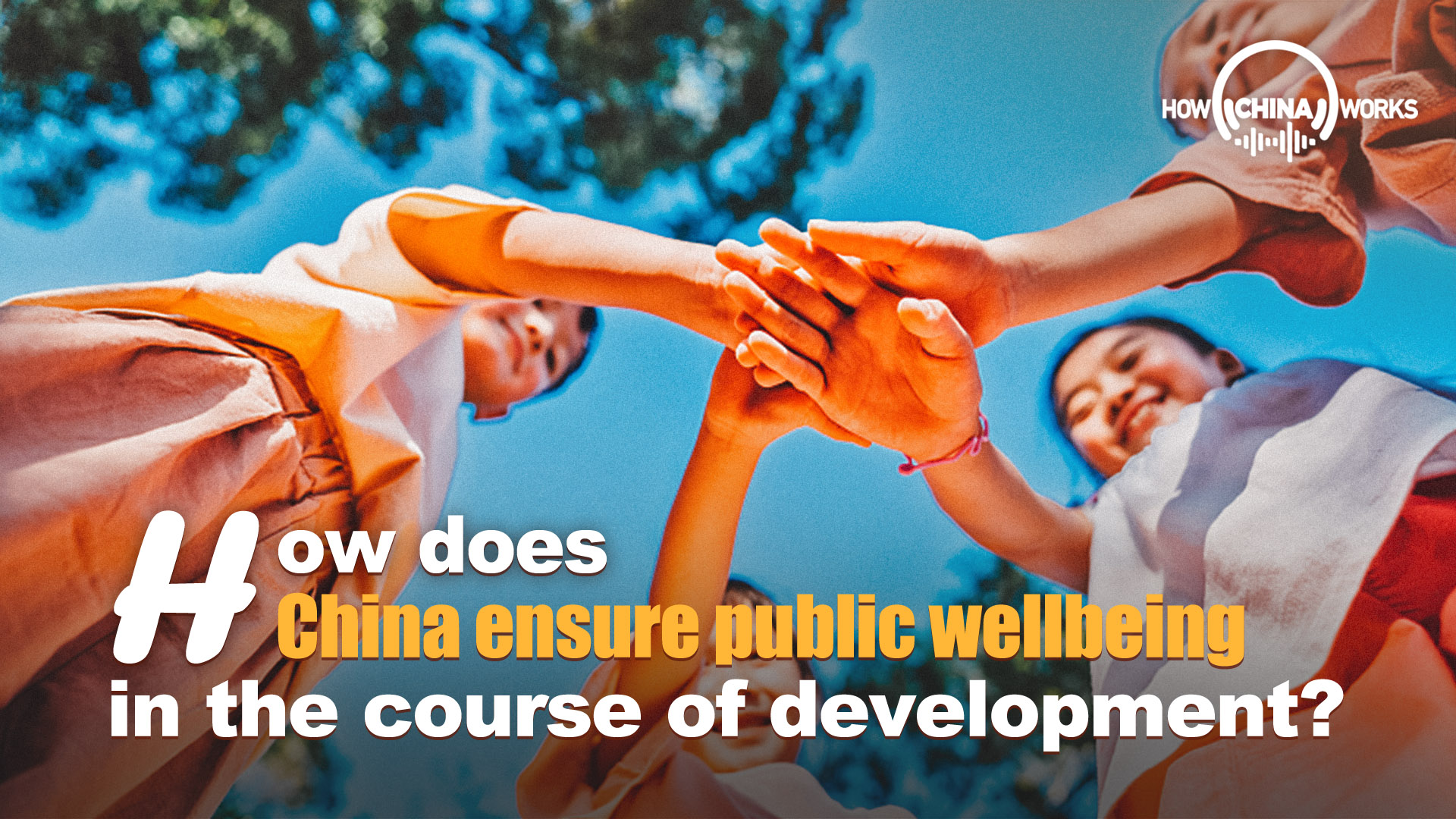
China has embarked on a new journey after marking the 100th anniversary of the founding of the Communist Party of China (CPC). Chinese President Xi Jinping, also general secretary of the CPC Central Committee and chairman of Central Military Commission, set out many requirements for Party members to meet in his speech at the centenary gathering on July 1 in Beijing. Bettering people's livelihood is one of them – an important criterion as the country advances along the path to the great rejuvenation of the Chinese nation and common prosperity.
Believing that the improvement of people's livelihood is a gateway to achieving common prosperity, Xi called in his speech on Party members to "ensure and enhance public well-being in the course of development."
The well-being of the people has always been front and center in China's policymaking. The issue has become more prominent after China declared in late 2020 the eradication of absolute poverty, which lays a solid foundation for achieving common prosperity.
Specific requirements on achieving common prosperity

A combine harvester operates in a field in east China's Shandong Province, June 11, 2021. /CFP
To promote common prosperity, specific requirements have been put forward in a series of official documents.
"People will lead a better life, and more notable and substantial progress will be achieved in promoting well-rounded human development and achieving common prosperity for everyone" by 2035, according to the document on the Long-Range Objectives Through the Year 2035.
The document said the proportion of middle-income group should be raised substantially and the gap between urban and rural areas, including living standards, must be narrowed down significantly. It also called for equal access to public services.
Amid unbalanced and inadequate regional development, realizing common prosperity for everyone is bound to be a long-term task that has to be done step by step with a clear strategy.
China's central authorities have chosen Zhejiang Province as an example and issued a guideline to help build the eastern province into a demonstration zone for achieving common prosperity.
Based on the local conditions, the guideline includes multiple measures that aim to solve inequitable development issues in the region with the hope of sharing the lessons learned and promoting the model nationwide in the future.
Ensuring public well-being in the course of development
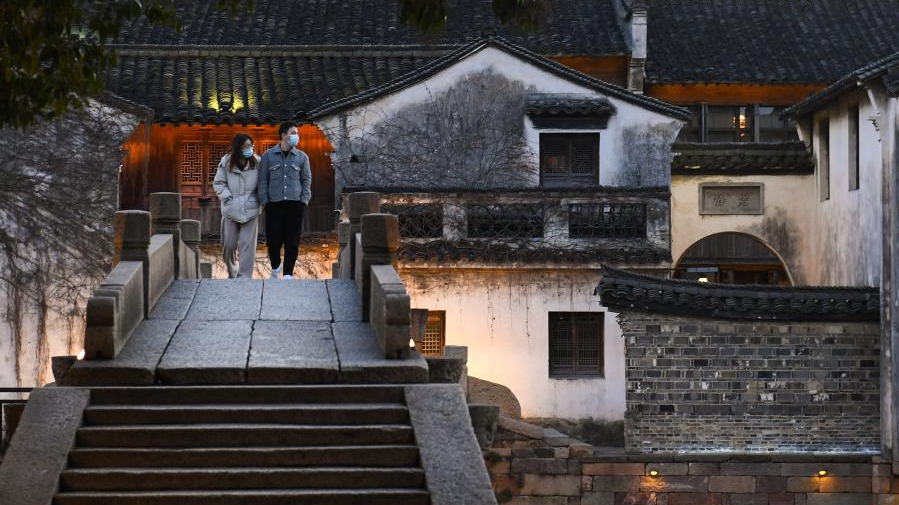
Tourists walk on a stone bridge in Wuzhen, east China's Zhejiang province, January 11, 2021. /Xinhua
The guideline raised a two-stage goal for Zhejiang to achieve substantial progress in building the demonstration zone. The per capita GDP should reach the level of moderately developed economies and a social structure with a middle-income population as the majority should be generally developed by 2025 with the aim of basically achieving common prosperity by 2035.
To meet the goals, Zhejiang will take action in six major areas ranging from developing digital economy to advancing cultural and green development.
Technological innovation will guide provincial authorities' quest for new economic growth engines, with more focus placed on harnessing the power of digital economy.
To increase the income of urban and rural residents while narrowing down the gap between the two groups, Zhejiang is to reform its income distribution and redistribution system by raising the minimum wage standard and regulating excessively high incomes.
Authorities have also promised to take an integrated development strategy to ensure equal access to public services by both urban and rural residents, improve their living condition and strengthen the building of social safety nets.

Volunteers are patrolling a lake over water quality in Wuzhuang Village, east China's Zhejiang province, April 7, 2021. /Xinhua
Meanwhile, Zhejiang also plans on strengthening the cultural industry, carrying forward the excellent traditional culture and promoting socialist culture through films and TV series.
Ecological environment protection will be another focus. Guided by the conviction that lucid waters and lush mountains are invaluable assets, the province will strengthen mechanisms on ecological protection and implement a green transformation in the modes of life and production.
Finally, to create a safe and comfort social environment, Zhejiang has called on officials at all levels to enhance their governance and streamline the administrative procedures. It has also stressed the importance of bettering the public legal services system and the public security system.
These ambitious plans reflect the CPC's unchangeable aspiration to seek happiness for the people. Under the Party's leadership, the country has created numerous miracles and is now inching closer to the great rejuvenation of the Chinese nation.

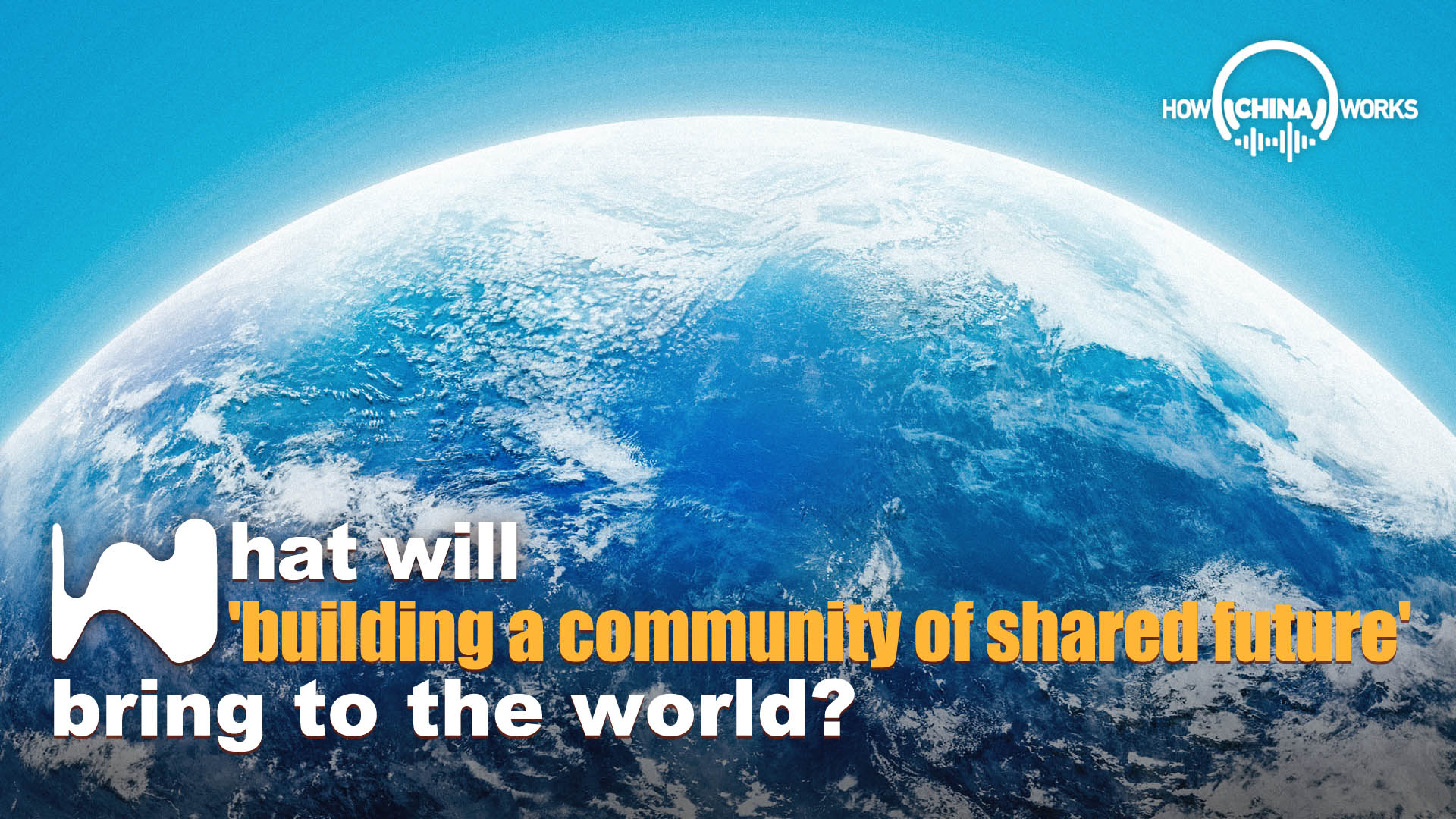
Against unilateralism and Cold War mentality
The human race needs more than ever to oppose unilateralism to vanquish the deadly pathogen, slow down the rising of sea levels, boost collective security and bolster common development. No one country can address these challenges alone.
The concept emphasizes respecting each other, discussing issues as equals and coordinating responses to traditional and non-traditional threats.
It advocates taking a new approach to developing state-to-state relations with communication, not confrontation, and with partnership, not alliance, opposing Cold War mentality which goes against the common aspiration of all countries to seek peace, development and cooperation.
"We will continue to champion cooperation over confrontation, to open up rather than closing our doors, and to focus on mutual benefits instead of zero-sum games. We will oppose hegemony and power politics," Xi stressed at the CPC centenary gathering.
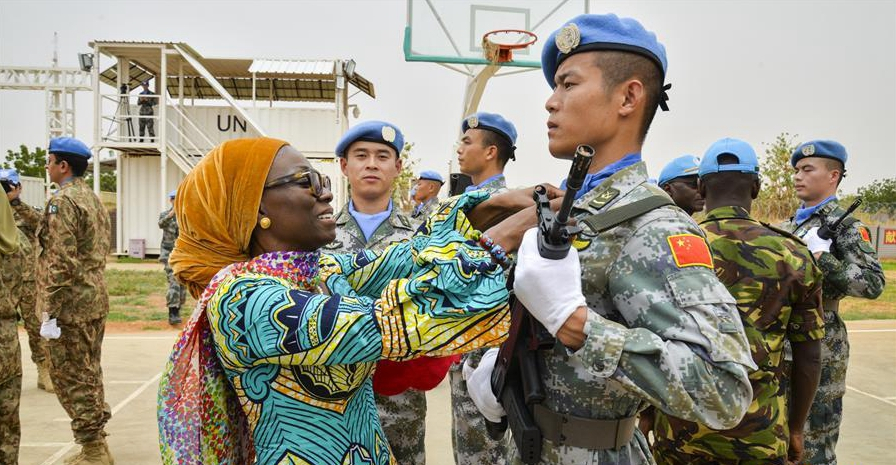
Anita Kiki Gebe, deputy joint special representative of the United Nations-African Union Mission in Darfur, awards a UN peace medal to a soldier of the 2nd China Medium Utility Helicopter Unit in El-Fashir, Sudan, July 17, 2019. /Xinhua
The concept is the guiding principle of China's international relations. It underlies China's strategic thoughts on the long-term development of its bilateral ties. China has not only advocated the vision but also set an example in practice.
In October 2017, "a community with a shared future for mankind" was written into the CPC's Constitution and included in the preamble of China's Constitution the following year.
China has also actively participated in UN-centered multilateral activities, joined an extensive range of multilateral treaties and international conventions, and promoted the peaceful settlement of key regional issues, including the Korean Peninsula issue, the Iranian nuclear issue and the Afghanistan issue.
To oppose vaccine nationalism and protectionism
The global fight against COVID-19 has also fully proved that the concept is the right way for the whole world to cope with global challenges and build "a community of common health for mankind."
China has fulfilled its solemn commitment to making vaccines a global public good. Notwithstanding the limited production capacity and enormous demand at home, China has honored its commitment by providing more than 350 million doses of vaccines to the international community, including vaccine assistance to over 80 countries and vaccine exports to 40 plus countries, making great contributions to narrowing the "immunization gap."
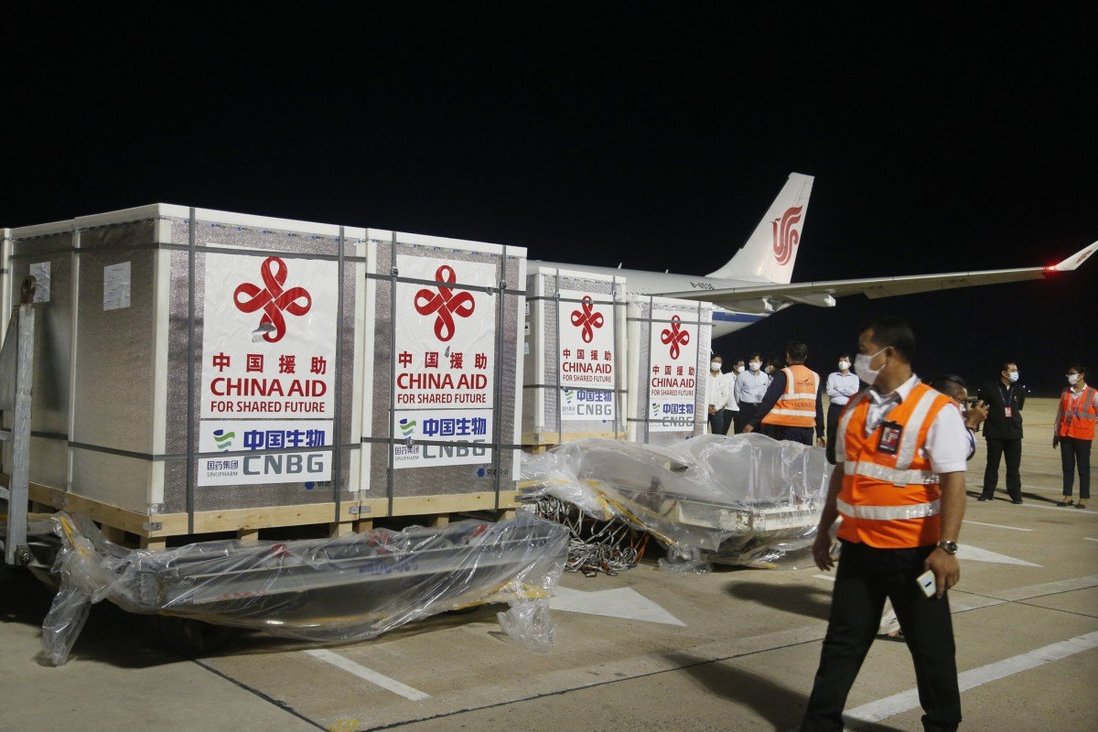
Transport the Sinopharm COVID-19 vaccine at Phnom Penh International Airport in Cambodia. /Xinhua
As a counter measure against the rise of protectionism, the concept calls for promoting trade and investment liberalization and facilitation, and making economic globalization more open, inclusive and balanced so that its benefits are shared by all.
China's annual contribution to world economic growth has remained at about 30 percent, and it has practiced building an open world economy with various measures, ranging from free trade zones across the country to new major fairs such as the China International Fair for Trade in Services in Beijing, the China International Import Expo in Shanghai, and the Consumer Products Expo in Hainan.
As President Xi pledged on July 1, China will promote high-quality development of the Belt and Road Initiative so that "China's new achievements in development will provide the world with new opportunities on the journey ahead."
Widespread international recognition gained
President Xi first put forth with the notion of "a community with a shared future for mankind" in his 2013 speech at the Moscow State Institute of International Relations.
"Mankind, by living in the same global village within the same time and space where history and reality meet, have increasingly emerged as a community of common destiny in which everyone has in himself a little bit of others," he said.
Today, the concept has been written into various documents, including UN resolutions, and is supported by the international community.
The concept was first adopted into an official UN document on February 10, 2017, at the 55th session of the UN Commission for Social Development and it was also enshrined by the UN Security Council, the Human Rights Council and the First Committee of the UN General Assembly, the Qingdao Declaration of the Council of Heads of Member States of the Shanghai Cooperation Organization, and the Forum on China-Africa Cooperation Beijing Action Plan (2019-2021), turning the Chinese concept into an international consensus.
According to the Chinese Foreign Ministry, countries including Pakistan, Cambodia, Myanmar and the Laos have agreed with China to build a community with a shared future to strengthen bilateral ties. At the regional level, the Association of Southeast Asian Nations, African countries, Arab states and Latin American and Caribbean nations have reached consensuses with China on the concept.
Now the concept bears greater significance and relevance at the UN's high-level meeting, as leaders of countries, large and small, rich and poor, are expected to jointly forge solutions on issues including global public health, full equality and climate action.



